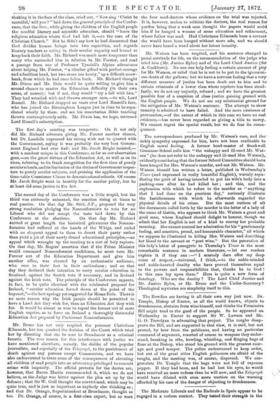moral feeling. A former head-master of Stockwell Grammar-School calls him
" the unhappy and ill-used Mr. Wat- son" (he does not refer to the unhappy and ill-used Mrs. Watson),. evidently considering that the former School Committee should have- been hanged for Mrs. Watson's murder, and not Mr. Watson. Mr. Watson himself has written a letter, published in Wednesday's- Times (and expressed in really beautiful English), warmly repu- diating the guilt of having intended to put his wife's body into a packing-case after he had killed her ; and this, and the- euphemism with which he refers to the murder as " anything that I had done on the previous day," curiously illustrate• the fastidiousness with which he afterwards regarded the physical details of his crime. But the most curious of all the documents called forth by the murder is the letter of a lady of the name of Gattie, who appears to think Mr. Watson a great and good man, whom England should delight to honour, though we admit that her English is not of a kind to convey her probable meaning. She cannot conceal her admiration for his "gentlemanly feeling, and sensitive, proud, and honourable character," all which we suppose he illustrated in killing Mrs. Watson and describing her blood to the servant as "port wine." But the peroration of this lady's letter of panegyric to Thursday's Times is the most remarkable sentence in modern literature, — let our readers explain it if they can :—" I scarcely dare offer my deep. sense of respect,—universal, I think,—to the noble-minded and noble-hearted duality who have proved themselves equal to the powers and responsibilities that, thanks be to God in this case lay upon them." Here is quite a new form of doxology. Who are the duality ? The Lord Chief Justice and Mr. Justice Byles, or Mr. Bruce and the Under-Secretary? Theological mysteries are simplicity itself to this.


































 Previous page
Previous page